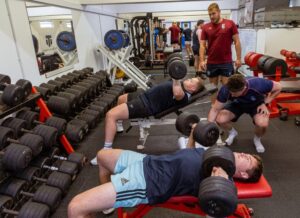With the physical and mental demands rugby places on our bodies, it is critical that we maximise the effectiveness of certain recovery protocols that will help manage and minimise fatigue from day to day and match to match.
In order to reduce fatigue, this article will focus on our basic, tried and tested methods that are certainly overlooked time and time again.
They are chosen because they have two distinct advantages in their favour:
- There are plenty of scientific studies to support these methods.
- These are always the go to methods of an elite athlete in any sport.
Our first and most powerful fatigue reducing method is…….
Sleep
Sleep is such a powerful method in reducing fatigue that it’s likely more effective than the other items on this list combined. In fact, if insufficient sleep is a chronic occurrence, it comes close to making even the best efforts on all other fatigue reducing methods null and void.
Going chronically without needed sleep leads to all sorts of fun effects, including reduced levels of performance, technique execution difficulties, and profound elevations of cortisol and decreases in testosterone. ….this we don’t want!!!
Going without sleep has also been shown to do two things that are especially interesting: cause fat gain and later, weight loss (if depravation gets bad enough). Fat gain combined with weight loss is literally the fastest way to lose muscle.
Sleep is good, no sleep is bad. What about some practical recommendations? How much is enough? Well, the average rugby player seems to need about eight hours of quality sleep per night. But that doesn’t mean much, because you might not be the average rugby player!
It seems that the best recommendation for sleep is: Get enough FOR YOU. Your some team mates might need six hours of sleep, and other team mates might need 10, but the only thing you need is enough sleep for your own physiological needs. How do you know you’re getting enough? The truth is: Unless you’re a little kid, you know.
If you wake up tired and get sleepy during the day all the time, you’re not getting enough quality sleep. If you feel ok without massive doses of stimulants, you’re likely fine. It’s always good to experiment with a bit more sleep if you’re ok to see if there is a benefit, but generally, it’s that simple. And the thing is, almost everyone KNOWS when they are sleep deprived. They know, but they say “my job is demanding” or “the stress keeps me from sleeping,” or they just love late-night TV and can’t quit the habit. And it’s ok to be sleep deprived now and again, but if it’s a chronic thing, it will have a large impact on your playing performance. That’s for sure. Is it all right to go out and have a few beers on the weekend a couple of times a month? Of course! But if you’re under-sleeping five days per week, you might benefit from making sure you get the sleep you need … on a regular basis.
Food
Second to sleep, the most powerful in beating fatigue is food. Unlike with sleep, where getting enough is the ticket, with food, the more the better (to a point). The most profound fatigue reduction comes from a hypercaloric diet.
If more calories are taken in than expended and weight is being gained, fatigue management becomes much more effective than otherwise. The less food you eat, the more difficult fatigue management becomes. While a properly balanced isocaloric (maintenance) diet can definitely help with recovery, the further calories dip below maintenance, the more profoundly fatigue has a tendency to accumulate. With dieting, this is just fact of life and must be accepted.
During fat loss dieting, that is precisely why making sure the other fatigue reduction methods like proper training management and sleep are in order. One of the most powerful – food – is no longer available in then needed quantities.
Calories are king when it comes to fatigue, but macronutrients matter too. And the most important of them? CARBS. That’s right, protein is not in its customary first place ranking this time. While protein builds and preserves muscle, carbs have a more profound effect on cumulative fatigue, mostly through their effects on muscle glycogen reserves. Low glycogen levels are in fact one of the most powerful single contributors to cumulative fatigue itself.
Eating enough carbs to replete glycogen can go a long way in fighting fatigue. Additionally, ingested carbs have a tendency to lower cortisol levels, which is a great added benefit. While about 1g of protein per pound of bodyweight per day is a good start, carb recommendations are made by training and activity volumes:
- 1g per pound per day for light or off days.
- 2g per pound per day for moderate-hard days.
- 3g per pound per day for super high volume days including multiple hard workouts per day (Gym session, Rugby Session etc).
You can go lower than these guidelines, especially when fat loss is the goal, but cutting carbs will eventually have negative effects on fatigue, so cut the least you can to still get the results you need.
Fats are important for various hormone production and have an effect on fatigue, though much more subtle.
Generally, keeping essential fats above 10% in grams of your bodyweight in pounds is a good idea.
Relaxing/Chill Out Activities
Third on our list of powerful fatigue reducing methods, participating in relaxing activities can be of great help. An old but quite profound discovery about the mechanisms of cumulative fatigue is that it is multifactorial. Fatigue can be accumulated from any kind of stressor – not just training or playing. This means that fatigue can be added from the usual physiological stresses of playing a game, but also from the caloric expenditure of daily activities, and even from psychological stressors. In the end, all of these sources of fatigue sum up to the total cumulative fatigue at any one time, and their negative effects on training and playing are still expressed to some extent regardless of their source. Thus, being under constant psychological stress can overwhelm fatigue management, even if plenty of sleep, food, and other fatigue reducing methods are present.
In order to deal with the fatigue of sleep deprivation, we get more sleep. In order to deal with hypocaloric-generated fatigue, we eat more food. And in order to deal with training/playing-induced fatigue, we take periods of easier training during the week leading into a game. In just the same way, fun and relaxing activities are a direct way to fight the fatigue that accumulates via psychological stressors. Going to the movies with your friends, taking a relaxing stroll, or even watching multiple episodes of Sons of Anarchy on Netflix as you stretch out on your secluded couch (my personal favourite) can go a long way in helping dissipate fatigue.
The first part of any attempt to manage fatigue needs to start in the gym. Light days and rest days, deloads, and active rest periods are a big part of this process and making sure you perform to the best of your ability on the pitch. Once you’ve got your training properly managed, using the fatigue management concepts detailed here (and possibly avoiding the ones that might not work) can help you handle more volume and intensity in your training from day to day, which will almost certainly lead to you being a better player!!
Written by
Robin Sowden-Taylor
Senior S&C Coach
Cardiff Blues





